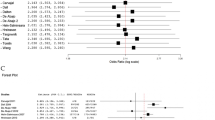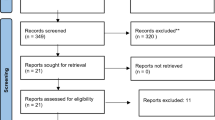Abstract
SSRIs have achieved a high usage rate in the treatment of depression because of a similar efficacy to TCAs and a favourable safety and tolerability profile. However, SSRI use has been associated with bleeding. We reviewed the epidemiological evidence on the association between SSRI use alone and the risk of upper gastrointestinal bleeding, and on synergistic effects reported with other commonly used drugs that can also cause bleeding.
A literature search identified four studies of SSRI use and risk for upper gastrointestinal bleeding and a further two studies of SSRI use and bleeding in general, including upper gastrointestinal bleeding. The available evidence indicates quite convincingly that SSRI use may play a causal role in upper gastrointestinal bleeding and that these drugs may act synergistically with other bleeding risk-increasing medications such as NSAIDs or low-dose aspirin. Assuming a causal role of SSRIs, reported excess gastrointestinal bleedings attributable to SSRI use was reported to be 3.1 per 1000 treatment years, 4.1 per 1000 treatment years among octogenarians and 11.7 per 1000 treatment years among persons with prior upper gastrointestinal bleeding.
These non-negligible risks warrant that prescribing doctors consider strategies on the individual level to reduce the likelihood of an upper gastrointestinal adverse event. Patients at particular risk include those with previous ulcers or gastrointestinal bleeding, the elderly and those with certain concurrent illnesses and/or high-risk comedications. Suggested strategies include alternatives to SSRI use, prescribing of less gastrotoxic NSAIDs or co-prescribing of gastroprotective drugs. Patients should be informed about the likelihood of possible upper gastrointestinal bleeding and high-risk patients should be followed closely.

Similar content being viewed by others
References
Moynihan R. Drug spending in North America rose by 11% in 2003. BMJ 2004; 328: 727
Geddes JR, Freemantle N, Mason J, et al. Selective serotonin reuptake inhibitors (SSRIs) versus other antidepressants for depressive disorder. Cochrane Database Syst Rev 1999; (4): CD001851
Skop BP, Brown TM. Potential vascular and bleeding complications of treatment with selective serotonin reuptake inhibitors. Psychosomatics 1996; 37: 12–6
Goldberg RJ. Selective serotonin reuptake inhibitors: infrequent medical adverse effects. Arch Fam Med 1998; 7: 78–84
Hergovich N, Aigner M, Eichler HG, et al. Paroxetine decreases platelet serotonin storage and platelet function in human beings. Clin Pharmacol Ther 2000; 68: 435–42
Wagner A, Montera D, Mårtenson B, et al. Effects of fluoxetine treatment of platelet 3H-imipramine binding, 5-HT uptake and 5-HT content in major depressive disorder. J Affect Disord 1990; 20: 101–13
Maurer-Spurej E, Pittendreigh C, Solomons K. The influence of selective serotonin reuptake inhibitors on human platelet serotonin. Thromb Haemost 2004; 91: 119–28
Hernandez-Diaz S, Garcia-Rodriguez LA. Epidemiologic assessment of the safety of conventional nonsteroidal anti-inflammatory drugs. Am J Med 2001; 110Suppl. 3A: 20–27S
Garcia Rodriguez LA, Hernandez-Diaz S. The risk of upper gastrointestinal complications associated with nonsteroidal anti-inflammatory drugs, glucocorticoids, acetaminophen, and combinations of these agents. Arthritis Res 2001; 3: 98–101
Humphries JE, Wheby MS, Vandenberg SR. Fluoxetine and the bleeding time. Arch Pathol Lab Med 1990; 114: 727–8
Evans TG, Buys SS, Rodgers GM. Acquired abnormalities of platelet function [letter]. N Engl J Med 1991; 324: 1671
Yaryura-Tobias JA, Kirschen H, Ninan P, et al. Fluoxetine and bleeding in obsessive-compulsive disorder. Am J Psychiatry 1991; 148: 949
Alderman CP, Moritz CK, Ben-Tovim DI. Abnormal platelet aggregation associated with fouxetine therapy. Ann Pharmacother 1992; 26: 1517–9
Aranth J, Lindberg C. Bleeding, a side effect of fluoxetine [letter]. Am J Psychiatry 1992; 149: 412
Gunzberger DW, Martinez D. Adverse vascular effects associated with fluoxetine [letter]. Am J Psychiatry 1992; 149: 1751
Ottervanger JP, Stricker BHC, Huls J, et al. Bleeding attributed to the intake of paroxetine. Am J Psychiatry 1994; 151: 781–2
Calhoun JW, Calhoun DD. Prolonged bleeding time in a patient treated with sertraline. Am J Psychiatry 1996; 153: 443
Leung M, Shore R. Fluvoxamine-associated bleeding. Can J Psychiatry 1996; 41: 604–5
Pai VB, Kelly MW. Bruising associated with the use of fluoxetine. Ann Pharmacother 1996; 30: 786–8
Wilmshurst PT, Kumar AV. Subhyaloid haemorrhage with fluoxetine. Eye 1996; 10: 141
Cooper TA, Valcour VG, Gibbons RB, et al. Spontaneous ecchymoses due to paroxetine administration. Am J Med 1998; 104: 197–8
Shen WW, Swartz CM, Calhoun JW. Is inhibition of nitric oxide synthase a mechanism for SSRI-induced bleeding? Psychosomatics 1999; 40: 268–9
Lake MB, Birmaher B, Wassick S, et al. Bleeding and selective serotonin reuptake inhibitors in childhood and adolescence. J Child Adolesc Psychopharmacol 2000; 10: 35–8
Vandel P, Vandel S, Kantelip JP. SSRI-induced bleeding: two case reports. Therapie 2001; 56: 445–7
de Maistre E, Allart C, Lecompte T, et al. Severe bleeding associated with use of low molecular weight heparin and selective serotonin reuptake inhibitors. Am J Med 2002; 113: 530–2
Smith M, Robinson D. Sertraline and vaginal bleeding: a possible association. J Am Geriatr Soc 2002; 50: 200–1
de Abajo FJ, Rodriguez LAG, Montera D. Association between selective serotonin reuptake inhibitors and upper gastrointestinal bleeding: population based case-control study. BMJ 1999; 319: 1106–9
van Walraven C, Mamdani MM, Wells PS, et al. Inhibition of serotonin reuptake by antidepressants and upper gastrointestinal leeding in elderly patients: retrospective cohort study. BMJ 2001; 323: 655–8
Dalton SO, Johansen C, Mellemkjaer L, et al. Use of selective serotonin reuptake inhibitors and risk of upper gastrointestinal tract bleeding: a population-based cohort study. Arch Intern Med 2003; 163: 59–64
Tata LJ, Fortun PJ, Hubbard RB, et al. Does concurrent prescription of selective serotonin reuptake inhibitors and nonsteroidal anti-inflammatory drugs substantially increase the risk of upper gastrointestinal bleeding? Aliment Pharmacol Ther 2005; 22: 175–81
Layton D, Clark DW, Pearce GL, et al. Is there an association between selective serotonin reuptake inhibitors and risk of abnormal bleeding? Results from a cohort study based on prescription event monitoring in England. Eur J Clin Pharmacol 2001; 57: 167–76
Meijer WE, Heerdink ER, Nolen WA, et al. Association of risk of abnormal bleeding with degree of serotonin reuptake inhibition by antidepressants. Arch Intern Med 2004; 164: 2367–70
Tatsumi M, Groshan K, Blakely RD, et al. Pharmacological profile of antidepressants and related compounds at human monoamine transporters. Eur J Pharmacol 1997; 340: 249–58
Po AL. Antidepressants and upper gastrointestinal bleeding. BMJ 1999; 319: 1081–2
Hill AB. The environment and disease: association or causation? Proc R Soc Med 1965; 58: 295–300
Ramasamy I. Inherited bleeding disorders: disorders of platelet adhesion and aggregation. Crit Rev Oncol Hematol 2004; 49: 1–35
Glassman AH, O’Connor CM, Califf RM, et al. Sertraline treatment of major depression in patients with acute MI or unstable angina. JAMA 2002; 288: 701–9
Cohen HW, Gibson G, Alderman MH. Excess risk of myocardial infarction in patients treated with antidepressant medications: association with use of tricyclic agents. Am J Med 2000; 108: 2–8
Sauer WH, Berlin JA, Kimmel SE. Selective serotonin reuptake inhibitors and myocardial infarction. Circulation 2001; 104: 1894–8
Sauer WH, Berlin JA, Kimmel SE. Effect of antidepressants and their relative affinity for the serotonin transporter on the risk of myocardial infarction. Circulation 2003; 108: 32–6
Meier CR, Schlienger RG, Jick H. Use of selective serotonin reuptake inhibitors and risk of developing first-time acute myocardial infarction. Br J Clin Pharmacol 2001; 52: 179–84
Serebruany VL, Glassman AH, Malinin AI, et al. Selective serotonin reuptake inhibitors yield additional antiplatelet protection in patients with congestive heart failure treated with antecedent aspirin. Eur J Heart Fail 2003; 5: 517–21
Bak S, Tsiropoulos I, Kjaersgaard JO, et al. Selective serotonin reuptake inhibitors and the risk of stroke: a population-based case-control study. Stroke 2002; 33: 1465–73
de Abajo FJ, Jick H, Derby L, et al. Intracranial haemorrhage and use of selective serotonin reuptake inhibitors. Br J Clin Pharmacol 2000; 50: 43–7
Movig KL, Janssen MW, de Waal MJ, et al. Relationship of serotonergic antidepressants and need for blood transfusion in orthopedic surgical patients. Arch Intern Med 2003; 163: 2354–8
Griffin MR, Scheiman JM. Prospects for changing the burden of nonsteroidal anti-inflammatory drug toxicity. Am J Med 2001; 110: 33–37S
Acknowledgements
The study was funded by the Danish Cancer Society and a grant from the International Epidemiology Institute. The authors report no potential conflicts of interest that are directly relevant to the content of this review.
Author information
Authors and Affiliations
Corresponding author
Rights and permissions
About this article
Cite this article
Dalton, S.O., Sørensen, H.T. & Johansen, C. SSRIs and Upper Gastrointestinal Bleeding. CNS Drugs 20, 143–151 (2006). https://doi.org/10.2165/00023210-200620020-00005
Published:
Issue Date:
DOI: https://doi.org/10.2165/00023210-200620020-00005




